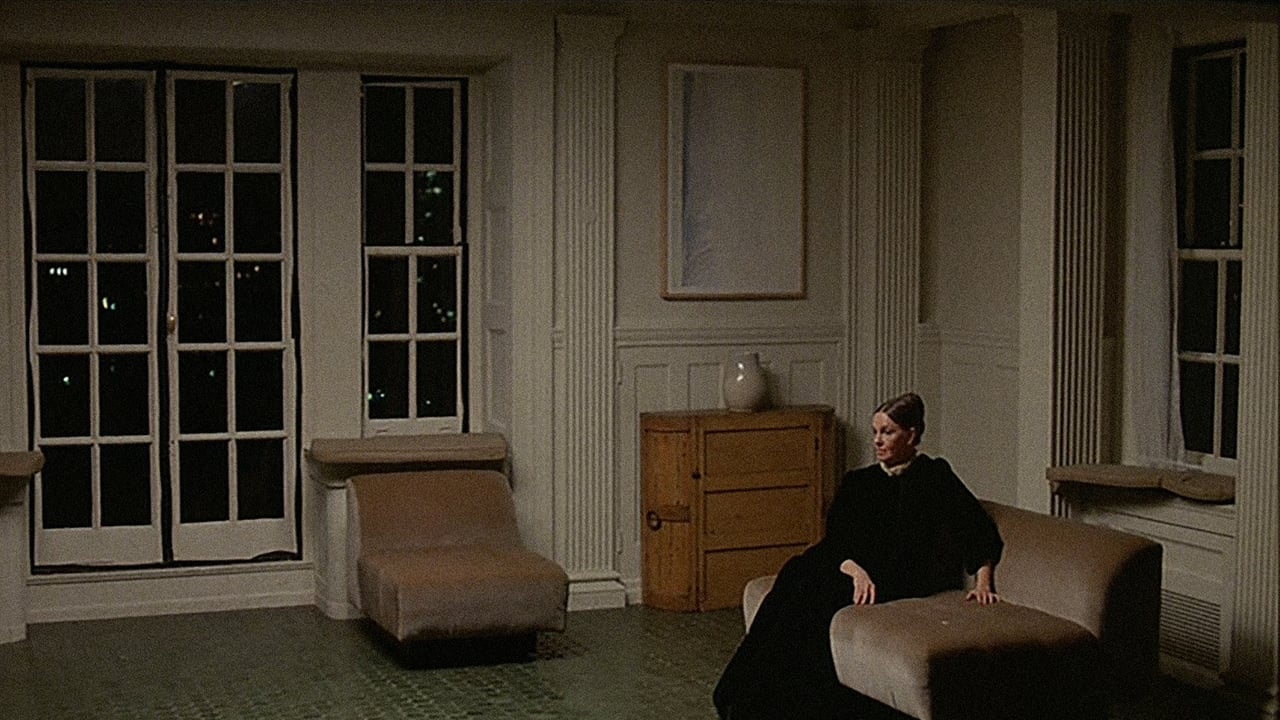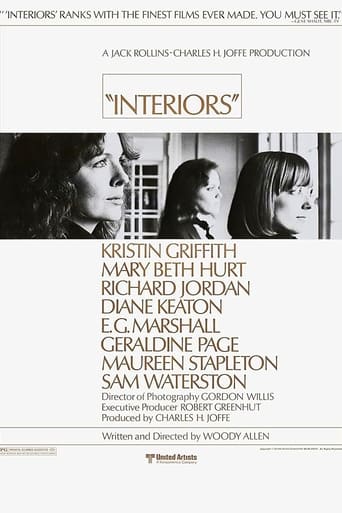Diagonaldi
Very well executed
TrueJoshNight
Truly Dreadful Film
Ogosmith
Each character in this movie — down to the smallest one — is an individual rather than a type, prone to spontaneous changes of mood and sometimes amusing outbursts of pettiness or ill humor.
Quiet Muffin
This movie tries so hard to be funny, yet it falls flat every time. Just another example of recycled ideas repackaged with women in an attempt to appeal to a certain audience.
Vahid Sohrabi
one of the less seen movies of Woody Allen, some sort of strange movie in Woody Allen's career. Film uses elements from Ingmar Bergman the favor director of Woody Allen. Actors and actresses have one of their best performances in this movie. The movie's world is completely tragic and deterministic. Characters are condemned to suffer from their relationships, their life and their interaction with the world. Woody Allen doesn't play himself in this movie but the shadow of his usual components has been kept in the characters. Components such as anxiety distress and etc. Interiors is an unique movie in Woody Allen's career.You have to see it!
sharky_55
In Allen's Stardust Memories, he lifted from Fellini and did it well by applying his own coat of comic absurdity which he always feels comfortable with. Here, the opening is reminiscent of Bergman, with its icy silence, the harsh, despairing voice-over and the bleak sparsity of nature reflected back at our character. This was Allen's first attempt at a drama after the hugely successful Annie Hall, and it shows. It is also his first film not to feature himself, which I think is crucial. Allen seems a little pained when he needed to diverge from that comedic archetype and can't quite let go. Crimes and Misdemeanors is brilliantly constructed but seems to flit in and out of a morbid moral dilemma and a lighter hearted Allen type who doesn't get all that he wants. In Interiors, the characters speak at length like they were in an Allen comedy, but continue with a darker, psychological edge about them. A decade later Allen would make the full fledged comedy version of this film in Hannah and Her Sisters, revolving not around the mother but the perfect sister. In that film, Allen seems again to be tacked on. The title refers to the mother hen of the family, Eve, who is an interior decorator. It is immediately obvious that this is less a career of passion than obsession; while she fields the questions of her children and their partners, she rearranges the room and muses that this shade is too strong and that this vase should belong in the bathroom. Many people would share this mania for control. But then we slowly discover that her preferences are not just directed towards furniture and decor; her children have long been pigeon-holed into their own neat little categories, and when her husband Arthur announces a trail separation, she reacts with the same speechless shock as if she was seeing a vase out of place or awkwardly clashing with the colour scheme. The precise rigidity of her life has been marred. The three sisters each have their own lives and troubles. Middle child Joey, traditionally the one with the less attention, has a terrible sort of curse on her life, being an intuitive and thoughtful thinker but not having the artistic talents or gifts her siblings have to express them. She is therefore the object of least affection, or at least until Eve has something to complain or vent about. The youngest is Flynn, who is the most beautiful and the most free of the family, relatively. It is obvious that time spent away from their toxicity has given her new life and license to pursue her dreams without her mother vicariously living through her every achievement. Naturally, they talk and snidely insult her behind her back. Keaton's Renata is the weakest of the trio - she comes off a little whiny, as the designated Allen intellectual probing with the issues of death and immortality. She has discovered that no matter how revered her poetry is, or how much it will be recited beyond her grave, it is of little meaning. She has the sort of gift that Joey would kill for, but endlessly agonises over other issues. The film's strengths lie in these characters and their dynamics which bounce off each other, and reveal bruises and long forgotten scars. Their dialogue is as heavy as Allen has ever written, although his detractors will once again question the sincerity of these issues on the backdrop of such a wealthy high-class lifestyle. They drown each other out in their arguments, and fling their own insecurities at one another in hopes of getting a tiny bit of recognition and sympathy. It becomes clear that this trait is inherited from none other than Eve herself, and suggests that it may be passed on in time. And then there is Pearl, the bright and exotic house-wrecker type that turns a trail separation into a permanent divorce. But it isn't during the children's youth, and although the family seem baffled by Arthur's decision, it does not seem unreasonable. He has provided for the family for a long time and feels as if he should be free to chase his own desires. Maureen Stapleton enters in a flashy red dress that no doubt would disgust Eve (and wreck the colour palette of the interiors). She's sensible, she's compassionate, she talks freely of her past loves without a hint of emotional baggage or resentment. She doesn't quite feel like discussing the nuances of the play they just saw. And there's the remarkably well-handled scene where she shows off her 'magic' and offers to read fortunes, except she is just turning over cards until she gets to the right one. What seems to be something that is set up for ridicule by the high-class intellectual family becomes a bit of harmless fun. And in resuscitating Joey, she breathes new life and sets herself up as the newer, more capable mother candidate, the complete antithesis of Eve. This is not as complex or confident in its dramatic depth as some of Allen's later films, but it remains an important step for his career.
leonblackwood
Review: This is quite a deep and emotional drama which is about an dysfunctional family who are trying to deal with a heavy divorce. The 3 girls are finding it difficult to deal with there parents splitting up and they are also going through there own personal problems in there own relationships. There mother seems to take the "Out of the blue" divorce, extremely hard, but she's convinced that she will get back with the husband until he announces that he has found another woman. It's quite a heavy drama with some emotional scenes, but the acting was brilliant by all of the cast who made the movie very believable. It does seem a bit one toned and every character is depressed through most of the movie, so you do have to be in the right frame of mind to watch it. Watchable!Round-Up: This really doesn't feel like a Woody Allen movie. In most of the movies that he has written, you can see a bit of his personality in the script, but this film really doesn't have any of his persona. There isn't any wit or any of his quirky lines all the way through the movie so it feels like there is someone else behind the camera. The really young Diane Keaton, impressed me with her deep performance, which reminded me lot of her amazing contribution to the Godfather franchise. Anyway, I personally found it a watchable movie which will touch many hearts, especially those who also have family issues.Budget: $10million Domestic Gross: $10.4millionI recommend this movie to people who are into there Woody Allen movies about a dysfunctional family, with 3 girls who are trying to hold it together during the break up of there parents. 6/10
TheLittleSongbird
Interiors is one of the most divisive films of one of the most love-it-hate-it directors. For me Interiors is not one of Allen's best films(Annie Hall, Crimes and Misdemeanours, Manhatten, Hannah and Her Sisters, Husbands and Wives) with some dialogue monologues that ramble on a bit too much, but when it comes to his most underrated films Interiors is very high on the list. It is very easy to see why people wouldn't like it with how bleak it is and how it's different from much of what Allen has done, but those are hardly reasons to dismiss Interiors because apart from the occasional rambling it is a great film. It is very stylishly shot with good use of locations, probably Allen's second most visually striking 70s film after Manhattan. Like Annie Hall, there's no music score and that's not a bad thing at all, Interiors is a very intimate and intricate film and having no music added to that quality. Much of the dialogue is full of insight and pathos, to me it did have dramatic weight and it is one of Allen's most honest films along with Husbands and Wives. The screenplay is not "funny" as such and is not as quotable as Annie Hall, but it wasn't ever meant to be. The story is paced deliberately but how Interiors was written and performed ensures that it isn't dull, it was very moving(personally it didn't topple into melodrama) and layered storytelling- didn't notice any convolutions- deftly handled. Allen directs assuredly in one of his more restrained directing jobs. The characters are neurotic and not the most likable, but are written and performed with such compelling realism that in the end there is some sympathy felt for them. The cast was a talented one in the first place, and none of them disappoint. Especially good are Geraldine Page, in one of her best performances, in very frightening and heart-breakingly tormented form and Mary Beth Hurt, the centrepiece of the story and is very affecting. Maureen Stapleton is a breath of fresh air as the most lively character- an anti thesis to the rest of the characters but not an out of place one- and E.G. Marshall brings a great deal of quiet dignity. Diane Keaton when it comes to Woody Allen films is better in Annie Hall and Manhattan but plays a purposefully shrill character with gusto. Richard Jordan and Sam Waterson are fine. Kristin Griffith is good too but her part seemed underwritten. All in all, won't be for everybody but a great film from personal perspective and one of Woody Allen's most underrated. 9/10 Bethany Cox

